For the 2025 school year, there are 2 public elementary schools serving 1,019 students in Tunkhannock Area School District. This district's average elementary testing ranking is 5/10, which is in the bottom 50% of public elementary schools in Pennsylvania.
Public Elementary Schools in Tunkhannock Area School District have an average math proficiency score of 33% (versus the Pennsylvania public elementary school average of 35%), and reading proficiency score of 51% (versus the 54% statewide average).
Minority enrollment is 6% of the student body (majority Hispanic), which is less than the Pennsylvania public elementary school average of 42% (majority Hispanic and Black).
Overview
This School District
This State (PA)
# Schools
4 Schools
2,145 Schools
# Students
2,014 Students
1,108,977 Students
# Teachers
153 Teachers
82,943 Teachers
Student : Teacher Ratio
13:1
13:1
District Rank
Tunkhannock Area School District, which is ranked within the bottom 50% of all 675 school districts in Pennsylvania (based off of combined math and reading proficiency testing data) for the 2021-2022 school year.
The school district's graduation rate of 85-89% has decreased from 90-94% over five school years.
Overall District Rank
#379 out of 684 school districts
(Bottom 50%)
(Bottom 50%)
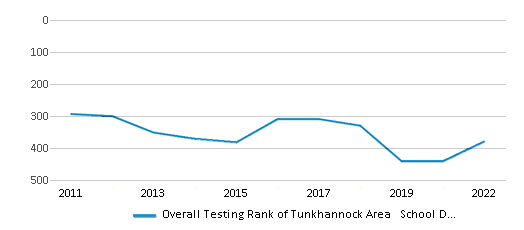
Math Test Scores (% Proficient)
33%
36%
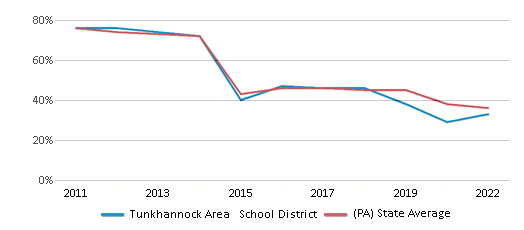
Reading/Language Arts Test Scores (% Proficient)
52%
55%
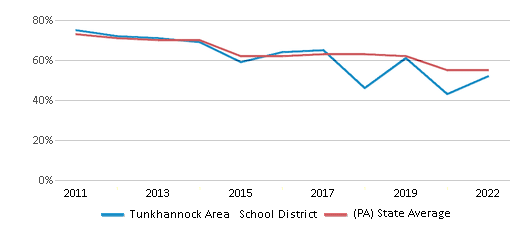
Science Test Scores (% Proficient)
58%
57%
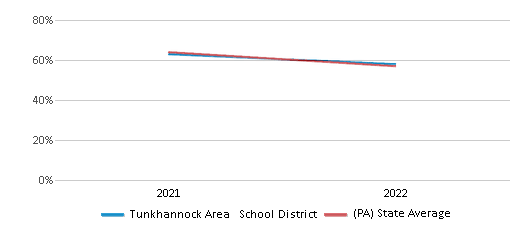
Graduation Rate
85-89%
87%
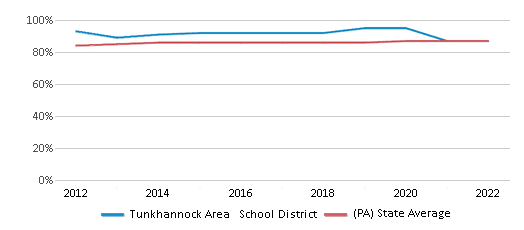
Students by Ethnicity:
Diversity Score
0.11
0.61
# American Indian Students
2 Students
2,278 Students
% American Indian Students
n/a
n/a
# Asian Students
5 Students
51,838 Students
% Asian Students
n/a
5%
# Hispanic Students
29 Students
173,776 Students
% Hispanic Students
1%
16%
# Black Students
12 Students
169,696 Students
% Black Students
1%
15%
# White Students
1,903 Students
645,871 Students
% White Students
95%
58%
# Hawaiian Students
4 Students
965 Students
% Hawaiian Students
n/a
n/a
# Two or more races Students
59 Students
63,991 Students
% of Two or more races Students
3%
6%
Students by Grade:
# Students in PK Grade:
-
7,744
# Students in K Grade:
115
110,287
# Students in 1st Grade:
156
120,767
# Students in 2nd Grade:
142
126,133
# Students in 3rd Grade:
146
120,907
# Students in 4th Grade:
165
125,574
# Students in 5th Grade:
156
126,000
# Students in 6th Grade:
139
126,698
# Students in 7th Grade:
150
94,854
# Students in 8th Grade:
162
93,972
# Students in 9th Grade:
149
16,255
# Students in 10th Grade:
163
14,467
# Students in 11th Grade:
197
12,872
# Students in 12th Grade:
174
12,447
# Ungraded Students:
-
-
District Revenue and Spending
The revenue/student of $25,177 is higher than the state median of $23,696. The school district revenue/student has grown by 6% over four school years.
The school district's spending/student of $23,754 is higher than the state median of $23,119. The school district spending/student has grown by 6% over four school years.
Total Revenue
$51 MM
$39,541 MM
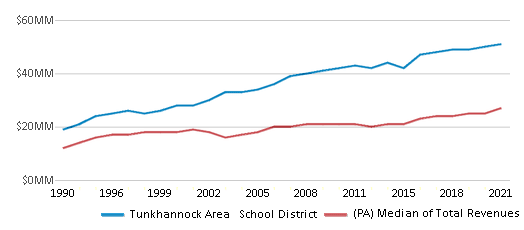
Spending
$48 MM
$38,578 MM
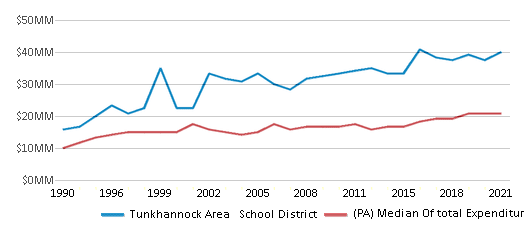
Revenue / Student
$25,177
$23,696
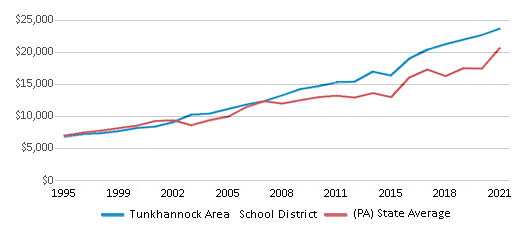
Spending / Student
$23,754
$23,119
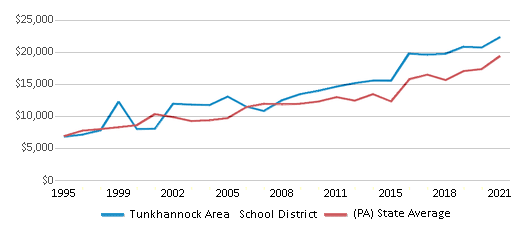
Best Tunkhannock Area School District Public Elementary Schools (2025)
School
(Math and Reading Proficiency)
(Math and Reading Proficiency)
Location
Grades
Students
Rank: #11.
Tunkhannock Area Intermediate Center
(Math: 33% | Reading: 51%)
Rank:
Rank:
4/
Bottom 50%10
200 Franklin Avenue
Tunkhannock, PA 18657
(570) 836-3111
Tunkhannock, PA 18657
(570) 836-3111
Grades: 3-6
| 606 students
Rank: n/an/a
99 Digger Dr
Tunkhannock, PA 18657
(570) 836-3111
Tunkhannock, PA 18657
(570) 836-3111
Grades: K-2
| 413 students
Recent Articles

Year-Round Or Traditional Schedule?
Which is more appropriate for your child? A year-round attendance schedule or traditional schedule? We look at the pros and cons.

Why You Should Encourage Your Child to Join a Sports Team
Participating in team sports has a great many benefits for children, there is no doubt. In this article you will learn what those benefits are.

White Students are Now the Minority in U.S. Public Schools
Increasing birth rates among immigrant families from Asia and Central and South America, combined with lower birth rates among white families, means that for the first time in history, public school students in the United States are majority-minority. This shift in demographics poses difficulties for schools as they work to accommodate children of varying language abilities and socio-economic backgrounds.





